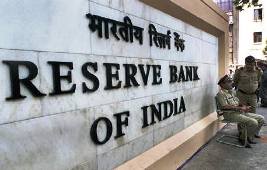 Leading foreign lender HSBC said on Thursday it sees little chance of a rate cut by the Reserve Bank of India next week, as nothing on the fiscal or inflation fronts has changed from the mid-quarter review last month.
Leading foreign lender HSBC said on Thursday it sees little chance of a rate cut by the Reserve Bank of India next week, as nothing on the fiscal or inflation fronts has changed from the mid-quarter review last month.
"With below-normal monsoon and little policy action from Delhi, the Reserve Bank is likely to keep rates unchanged next week.
"The fiscal stance remains to loose for comfort and elevated inflation expectations are a concern," HSBC chief economist for India & Asean, Leif Eskesen, said in a report.
Though there has been policy progress in Europe, the global economic backdrop remains decidedly challenging, Eskesen said, adding domestic conditions have remained fairly stable, though, and underlying inflation has stayed firm.
Reserve Bank Governor Duvuuri Subbarao will unveil the first quarter monetary policy on Tuesday next and the government and the credit-starved industry are clamouring for some growth-enabling action from the Mint Road, in view of decelerating growth numbers and tepidly moving inflation.
While gross domestic product growth hit a nine-year low last fiscal at 6.5 per cent, inflation still remains elevated at 7.25 per cent for June.
Despite all the poor GDP numbers, the RBI left the policy rates and CRR unchanged at the last meeting on June 16.
But Eskesen said staying on hold was the right decision as RBI saw a big portion of the slowdown in growth unrelated to interest rates and instead more structural in nature, making rate cuts ineffective as a tool to raise growth.
Since the
US indicators have softened in recent months.
This has increased the likelihood that the Fed may need to step in again, he said, adding that in Europe, the real economy has continued to weaken, including in core countries, and progress on policies to address the debt crisis has failed to assuage market concerns.
On the domestic economy, HSBC said the latest high-frequency readings suggest a relatively steady pace of expansion.
The June HSBC purchasing managers index readings were broadly stable, industrial output grew faster than expected, and private credit has continued at cruising speed.
Nevertheless, in all cases, growth is moderate by historical standards.
Private non-food credit growth slowed marginally to 16.7 per cent y-o-y in May from 16.9 per cent in April, which is only a shade lower than RBI's full year assumption of 17 per cent.
On inflation, he said though June WPI inflation eased to 7.25 per cent on the back of non-food primary articles and fuel prices, food inflation is ticking up and core inflation is steady.
In light of this, RBI's assessment of growth and inflation risks should not have changed materially since June.
"As such, we believe RBI will remain on hold to further monitor global developments and the summer monsoons, not following the lead of some of its Asian peers.
"It will closely watch decisions from New Delhi, with efforts to bring fiscal consolidation and structural reforms back on track also key determinants of any future monetary policy action," Eskesen concluded.











 © 2025
© 2025